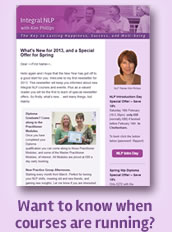The Phenomenal Power of Your Unconscious Mind

Freud conceived that the unconscious mind contains all of our repressed, unresolved memories and experiences. The humanistic perspective sees the unconscious as a reservoir of skills and resources that can be nurtured and cultivated.
But what is the unconscious mind? Well your unconscious mind is the part of you that you are not conscious of right now. So this involves everything that is not in your present moment awareness. For example, you wouldn’t be conscious of your breathing if you hadn’t have thought of this now. It may help to view your unconscious mind as a storehouse because it includes all the mental processes, memories, thoughts, ideas and images going on in your mind. It protects you from pain by repressing painful experiences and memories, but it also stores all your positive experiences and memories too.
Your unconscious mind enables you to do many things without thinking, such as governing your body’s autonomous processes and healing mechanisms, circulating your blood, causing your heart to beat, your eyes to blink and communicating with every cell in your body. Plus your unconscious mind creates strategies and habits enabling you to sign your name automatically, tie a shoelace, brush your teeth, stop at a red light and so on without conscious thought. Firstly, you learn how to do these tasks consciously and then through repetition and reinforcement your unconscious takes over and runs these strategies on autopilot.
Your unconscious learns both good strategies and bad strategies. However, once the habit or strategy is installed in our neurology, it can become very difficult to undo. This is fine if the habits are positive and serving us, but not so good if the habits are unwanted, such as nail biting, smoking, comfort eating, worry, allergies and so on.
Neuro-linguistic programming (NLP) shows you how to ‘talk’ to your unconscious mind so you can undo unwanted habits and install more beneficial strategies. Many NLP techniques deliberately by-pass the conscious mind, the part of your mind that criticises, judges, resists and doubts, because this can interfere with and sabotage any possibility of change. The conscious mind likes to analyse and it can be counterproductive to analyse because this can get in the way of the solution. As Einstein once famously said, ‘you cannot solve a problem with the same kind of thinking that created it.’
One of the great benefits of NLP is that you learn a range of tools and techniques that allow you to tap into the tremendous storehouse of unconscious resources, skills and creativity. You learn to move away from negative habits, strategies, emotional states and thought patterns to more empowering, positive results. States such as worry, fear, stress, conflict, sadness, hurt, guilt and frustration lessen. Unwanted habits and strategies from obesity to allergies drop away as we move towards cultivating positive habits, strategies, thoughts and emotions. And greater success, confidence, motivation, creativity, health, happiness, peace and love are all yours to enjoy.
Kim Phillips
But what is the unconscious mind? Well your unconscious mind is the part of you that you are not conscious of right now. So this involves everything that is not in your present moment awareness. For example, you wouldn’t be conscious of your breathing if you hadn’t have thought of this now. It may help to view your unconscious mind as a storehouse because it includes all the mental processes, memories, thoughts, ideas and images going on in your mind. It protects you from pain by repressing painful experiences and memories, but it also stores all your positive experiences and memories too.
Your unconscious mind enables you to do many things without thinking, such as governing your body’s autonomous processes and healing mechanisms, circulating your blood, causing your heart to beat, your eyes to blink and communicating with every cell in your body. Plus your unconscious mind creates strategies and habits enabling you to sign your name automatically, tie a shoelace, brush your teeth, stop at a red light and so on without conscious thought. Firstly, you learn how to do these tasks consciously and then through repetition and reinforcement your unconscious takes over and runs these strategies on autopilot.
Your unconscious learns both good strategies and bad strategies. However, once the habit or strategy is installed in our neurology, it can become very difficult to undo. This is fine if the habits are positive and serving us, but not so good if the habits are unwanted, such as nail biting, smoking, comfort eating, worry, allergies and so on.
Neuro-linguistic programming (NLP) shows you how to ‘talk’ to your unconscious mind so you can undo unwanted habits and install more beneficial strategies. Many NLP techniques deliberately by-pass the conscious mind, the part of your mind that criticises, judges, resists and doubts, because this can interfere with and sabotage any possibility of change. The conscious mind likes to analyse and it can be counterproductive to analyse because this can get in the way of the solution. As Einstein once famously said, ‘you cannot solve a problem with the same kind of thinking that created it.’
One of the great benefits of NLP is that you learn a range of tools and techniques that allow you to tap into the tremendous storehouse of unconscious resources, skills and creativity. You learn to move away from negative habits, strategies, emotional states and thought patterns to more empowering, positive results. States such as worry, fear, stress, conflict, sadness, hurt, guilt and frustration lessen. Unwanted habits and strategies from obesity to allergies drop away as we move towards cultivating positive habits, strategies, thoughts and emotions. And greater success, confidence, motivation, creativity, health, happiness, peace and love are all yours to enjoy.
Kim Phillips
Who Am I?
I am your constant companion.
I am your greatest helper or heaviest burden.
I will push you onward or drag you down.
I am completely at your command.
Half the things you do you might just as well turn over to me.
I will be able to do them quickly and correctly.
I am easily managed – you must merely be firm with me.
Show me exactly how you want something to be done and
after a few lessons I will do it automatically.
I am the servant of all great individuals and, alas,
of all failures as well.
Those who are great, I have made great.
Those who are failures, I have made failures.
I am not a machine, though I work
with all the precision of a machine plus the intelligence of a human.
You may run me for profit or run me for ruin -
It makes no difference to me.
Take me, train me, be firm with me,
And I will place the world at your feet.
Be easy with me and I will destroy you.
Who am I?
I am a habit.
(Anon)
I am your greatest helper or heaviest burden.
I will push you onward or drag you down.
I am completely at your command.
Half the things you do you might just as well turn over to me.
I will be able to do them quickly and correctly.
I am easily managed – you must merely be firm with me.
Show me exactly how you want something to be done and
after a few lessons I will do it automatically.
I am the servant of all great individuals and, alas,
of all failures as well.
Those who are great, I have made great.
Those who are failures, I have made failures.
I am not a machine, though I work
with all the precision of a machine plus the intelligence of a human.
You may run me for profit or run me for ruin -
It makes no difference to me.
Take me, train me, be firm with me,
And I will place the world at your feet.
Be easy with me and I will destroy you.
Who am I?
I am a habit.
(Anon)




